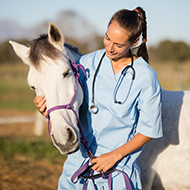RVC and Penn Vet unveil new equine research scholarship

The programme promises an 'unparalled' learning experience for the successful applicant.
The Royal Veterinary College (RVC), the University of Pennsylvania's School of Veterinary Medicine (Penn Vet) and MARS EQUESTRIAN have collaborated to launch a new international scholarship programme.
Focused on advancing horse health and welfare, the scholarship will provide a unique experience for one aspiring veterinary investigator to research alongside high-renowned veterinary welfare researchers and professionals.
The successful applicant will have the opportunity to gain two advanced credentials, the Graduate Certificate in Animal Welfare and Behaviour at Penn Vet over the course of the first year, and the Master of Research (MRes) programme at the RVC over the course of the second year.
Applicants must hold a veterinary degree (BvetMed/DVM/VMD/BVSc or equivalent), and can be a UK, US or international candidate. The chosen candidate will receive tuition, travel expenses and an annual stipend.
Dr Kyla Ortved from Penn University, who will serve as the primary mentor for the successful applicant's embedded research project, said: “There are two fundamental components to a successful career in the veterinary medicine field: exceptional mentorship and the continuous pursuit of applicable knowledge.
“The multidisciplinary approach of the MARS EQUESTRIAN Veterinary Research Scholar Programme is set to provide both of these cardinal elements through an experiential learning environment that will ultimately culminate in delivering meaningful advancements that will have a very real, positive impact on the lives of our equine partners.”
Professor Richard Bomphrey, interim vice principal for Research at the RVC commented: “I am delighted that the RVC is able to support this new transatlantic initiative for veterinary graduates following a generous donation from MARS EQUESTRIAN.
“It strengthens the ties between the RVC, the University of Pennsylvania and MARS EQUESTRIAN while providing an outstanding training and research opportunity.
“We look forward to welcoming the successful scholar and helping them to make an impact in equine research."
The programme will begin in September 2022 in the United States, and will move to the UK in October 2023. The deadline for submissions is March 15 2022, or until an acceptable candidate is identified. Applications should be sent to Dr Kyla Ortved at kortved@vet.upenn.edu



 The RCVS has announced a new version of its 1CPD mobile app, with enhanced features for veterinary surgeons and veterinary nurses to record their continuing professional development.
The RCVS has announced a new version of its 1CPD mobile app, with enhanced features for veterinary surgeons and veterinary nurses to record their continuing professional development.